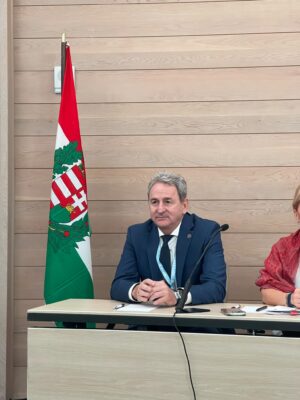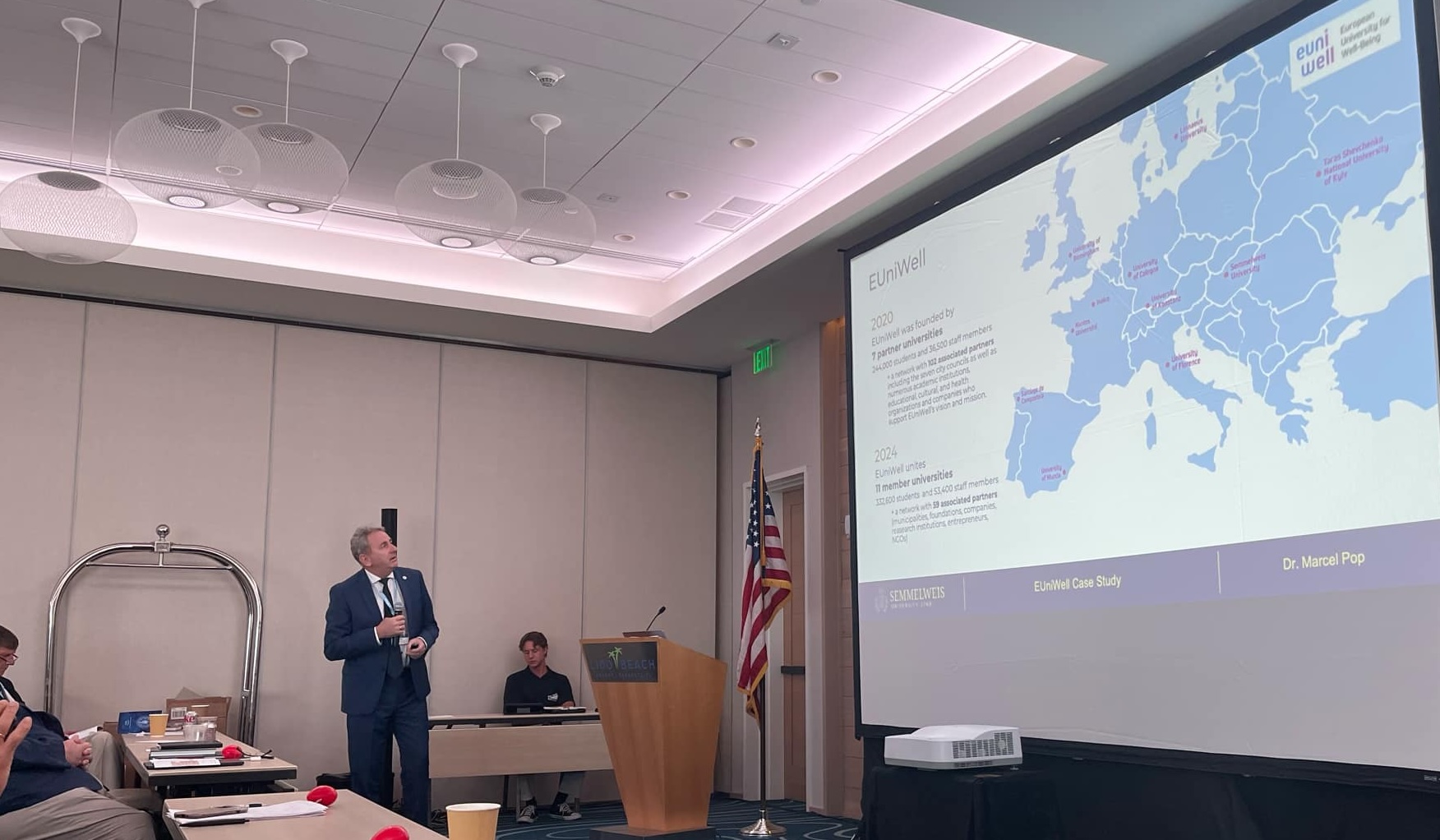On October 29, 2024, Dr. Marcel Pop, Director of International Relations at Semmelweis University, participated in the 55th Annual Scientific Meeting of the Hungarian Medical Association of America (HMAA) in Sarasota, USA. During his visit, he presented the results of the European University of Well-Being (EUniWell) as a higher education innovation. The participation in the project aimed at enhancing Semmelweis University’s global network and potential transatlantic research collaborations.
 At the Scientific Meeting, Dr. Marcel Pop presented Semmelweis University’s participation in the European Universities Initiative and the outcomes of the EUniWell #Research project.
At the Scientific Meeting, Dr. Marcel Pop presented Semmelweis University’s participation in the European Universities Initiative and the outcomes of the EUniWell #Research project.
Semmelweis University has been a founding member of the Alliance since 2020. Explaining the motivation for transatlantic cooperation, Dr. Pop highlighted that EUniWell’s internationalization strategy is focused on expanding its global reach and enhancing a multidimensional approach to well-being, addressing individual and societal health. He outlined that the EUniWell #Research project’s objective was to establish a common Research & Innovation (R&I) Strategic Framework, addressing Europe’s well-being challenges through an Alliance-wide research ecosystem and a coordinated EUniWell research agenda.
About EUniWell
The EUniWell (European University for Well-Being) Alliance includes 11 universities with more than 330,000 students, nearly 60,000 university staff, and over a thousand research groups. The member universities are the University of Birmingham (United Kingdom), University of Florence (Italy), Inalco (France), University of Konstanz (Germany), University of Cologne (Germany), Linnaeus University (Sweden), University of Murcia (Spain), University of Nantes (France), University of Santiago de Compostela (Spain), Semmelweis University (Hungary), and Taras Shevchenko National University (Ukraine).
The EUniWell #Research project is one of the consortium’s programs supported by the Horizon 2020 SwafS program.
As the United States presents a suitable potential partnership due to its shared values with Europe, a growing focus on well-being, and its access to key scientific publication markets and job opportunities for EUniWell graduates, EUniWell plans to establish a global strategy involving transatlantic cooperations.

Dr. Marcel Pop emphasized that HMAA’s collaboration with EUniWell could yield substantial benefits in education, research, and healthcare. By partnering in research and innovation, the HMAA would gain access to EUniWell’s expertise in well-being and health sciences, creating opportunities for joint medical research projects, especially in areas like public health, mental health, and healthcare technology. This partnership could also expand educational resources for HMAA members, providing access to advanced programs, workshops, and seminars from leading European medical faculties, therefore enhancing Continuing Medical Education (CME) for Hungarian-American doctors. Furthermore, the cooperation would facilitate exchange programs for students and professionals, allowing Hungarian-American medical experts to study, teach, or conduct research at European universities, thereby encouraging knowledge transfer and innovation in medical practices. Together, both organizations could work on global health and well-being initiatives, aligned with HMAA’s mission to promote public health and medical knowledge dissemination. Finally, the collaboration would raise HMAA’s visibility and strengthen its networking opportunities across Europe and the United States, establishing connections with medical professionals, researchers, and institutions throughout the EU, and opening doors to new partnerships and projects.
About HMAA
The voluntary organization of The Hungarian Medical Association of America consist of physicians and scientist of Hungarian heritage. The Association’s goal is to unite these physicians and scientists from North America and Hungary, as well as to establish professional interaction between medical societies, universities and institutions, to advance medical education by providing scholarships and exchange programs. The annual scientific meetings, lectures, discussions and publications of the organization provide a platform to promote and distribute knowledge of clinical medicine and basic medical sciences.
The cooperation between the faculties of medicine in Hungarian medical universities and the State University of New York and Buffalo School of Medicine and Biomedical Sciences started in the 1980’s. This collaboration has given opportunity for more than 300 Hungarian medical students to have spent their internships in the US.
Semmelweis University extended the cooperation agreement in 2015, to expand its contents and include the faculty of dentistry in the program as well.